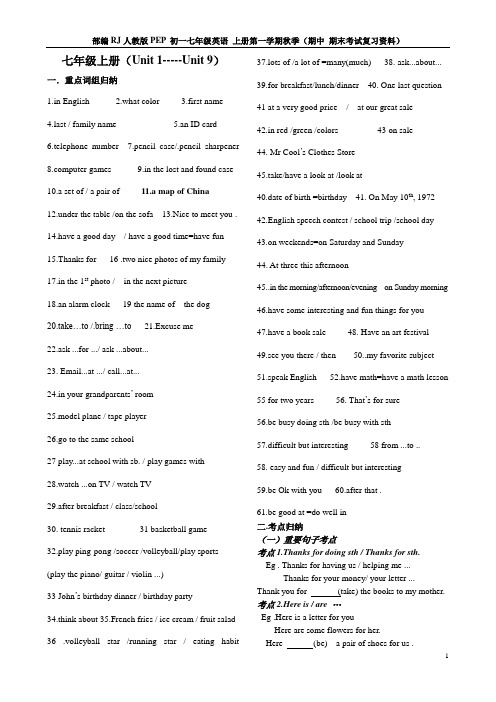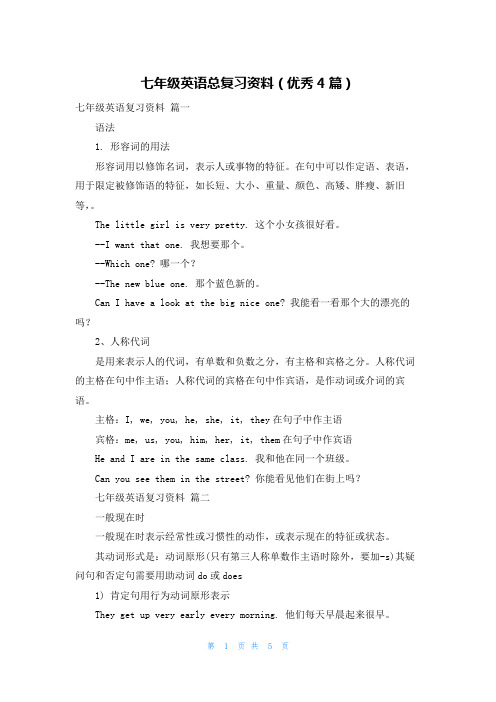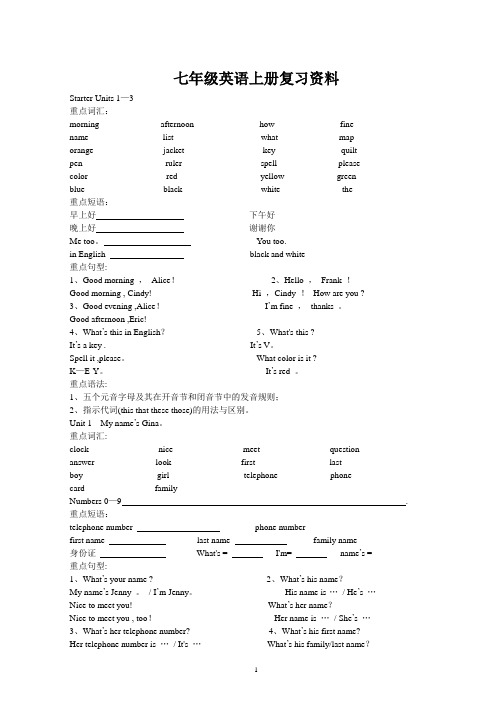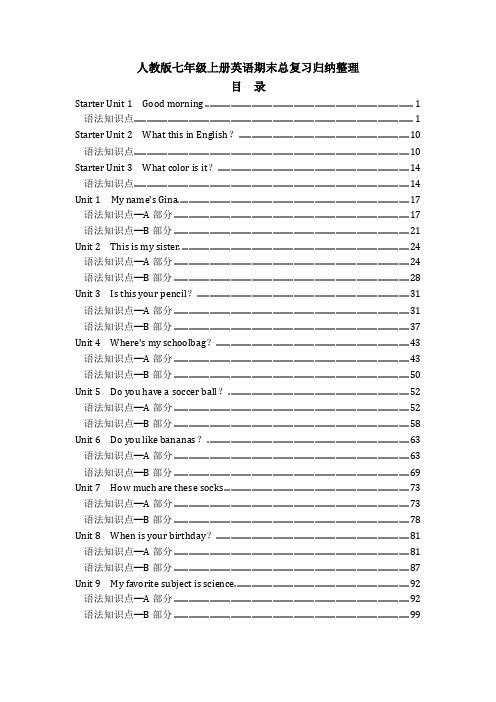七年级英语上期末复习资料
部编RJ人教版PEP 初一七年级英语 上册第一学期秋季(期中 期末考试复习资料)课本复习考点归纳

七年级上册(Unit 1-----Unit 9)一.重点词组归纳1.in English2.what color3.first namest / family name5.an ID card6.telephone number7.pencil case/.pencil sharpenerputer games9.in the lost and found case 10.a set of / a pair of 11.a map of China12.under the table /on the sofa 13.Nice to meet you .14.have a good day / have a good time=have fun15.Thanks for 16 .two nice photos of my family17.in the 1st photo / in the next picture18.an alarm clock 19 the name of the dog20.take…to /.bring …to 21.Excuse me22.ask ...for .../ ask ...about...23. Email...at .../ call...at...24.in your grandparents’ room25.model plane / tape player26.go to the same school27 play...at school with sb. / play games with28.watch ...on TV / watch TV29.after breakfast / class/school30. tennis racket 31 basketball game32.play ping-pong /soccer /volleyball/play sports (play the piano/ guitar / violin ...)33 John’s birthday dinner / birthday party34.think about 35.French fries / ice cream / fruit salad 36 .volleyball star /running star / eating habit 37.lots of /a lot of =many(much) 38. ask...about...39.for breakfast/lunch/dinner 40. One last question41 at a very good price / at our great sale42.in red /green /colors 43 on sale44. Mr Cool’s Clothes Store45.take/have a look at /look at40.date of birth =birthday 41. On May 10th, 197242.English speech contest / school trip /school day43.on weekends=on Saturday and Sunday44. At three this afternoon45..in the morning/afternoon/evening on Sunday morning46.have some interesting and fun things for you47.have a book sale 48. Have an art festival 49.see you there / then 50..my favorite subject 51.speak English 52.have math=have a math lesson55 for two years 56. That’s for sure56.be busy doing sth /be busy with sth57.difficult but interesting 58 from ...to ..58. easy and fun / difficult but interesting59.be Ok with you 60.after that .61.be good at =do well in二.考点归纳(一)重要句子考点考点1.Thanks for doing sth / Thanks for sth.Eg . Thanks for having us / helping me ...Thanks for your money/ your letter ...Thank you for (take) the books to my mother. 考点2.Here is / are …Eg .Here is a letter for youHere are some flowers for her.Here (be) a pair of shoes for us .考点3.Let’s ...1) let’s 后接动词原形,let’s not 后接动词原形2) let ‘s ...引导的句子,对方应怎样表达个人的看法.赞成时用:that’s a good idea / that sounds great . Eg: Let’s (play ) basketball.Let’s (not, go ) home now . ----Let’s go to the movies this afternoon .-----That (sound) good .考点4.购物的句型1)Can I help you ? = What can I do for you ?2)I’ll take it/them = I’ll buy it /them3)How m uch +be +sth ? = What’s the price of sth? Eg: What is the price of the white watch ?(同义句)the white watch?考点5.think 用法Sb +think +主语+谓语注: 否定前移Eg: I English fun .我认为英语很有趣。
七年级英语总复习资料(优秀4篇)

七年级英语总复习资料(优秀4篇)七年级英语复习资料篇一语法1. 形容词的用法形容词用以修饰名词,表示人或事物的特征。
在句中可以作定语、表语,用于限定被修饰语的特征,如长短、大小、重量、颜色、高矮、胖瘦、新旧等,。
The little girl is very pretty. 这个小女孩很好看。
--I want that one. 我想要那个。
--Which one? 哪一个?--The new blue one. 那个蓝色新的。
Can I have a look at the big nice one? 我能看一看那个大的漂亮的吗?2、人称代词是用来表示人的代词,有单数和负数之分,有主格和宾格之分。
人称代词的主格在句中作主语;人称代词的宾格在句中作宾语,是作动词或介词的宾语。
主格:I, we, you, he, she, it, they在句子中作主语宾格:me, us, you, him, her, it, them在句子中作宾语He and I are in the same class. 我和他在同一个班级。
Can you see them in the street? 你能看见他们在街上吗?七年级英语复习资料篇二一般现在时一般现在时表示经常性或习惯性的动作,或表示现在的特征或状态。
其动词形式是:动词原形(只有第三人称单数作主语时除外,要加-s)其疑问句和否定句需要用助动词do或does1) 肯定句用行为动词原形表示They get up very early every morning. 他们每天早晨起来很早。
I visit my grandparents four times a month. 我一个月去看望祖父母四次。
2) 否定句用don’t + 动词原形来表示We do not go shopping on Sundays. 我们周日不去购物。
I do n’t think you like this colour. 我想你不喜欢这个颜色。
人教版七年级上册英语期末复习资料(1)

七年级英语上册复习资料Starter Units 1—3重点词汇:morning afternoon how finename list what maporange jacket key quiltpen ruler spell pleasecolor red yellow greenblue black white the重点短语:早上好下午好晚上好谢谢你Me too。
You too.in English black and white重点句型:1、Good morning ,Alice!2、Hello ,Frank !Good morning , Cindy! Hi ,Cindy !How are you ?3、Good evening ,Alice!I’m fine ,thanks 。
Good afternoon ,Eric!4、What’s this in English?5、What's this ?It’s a key . It’s V。
Spell it ,please。
What color is it ?K—E-Y。
It’s red 。
重点语法:1、五个元音字母及其在开音节和闭音节中的发音规则;2、指示代词(this that these those)的用法与区别。
Unit 1 My name’s Gina。
重点词汇:clock nice meet questionanswer look first lastboy girl telephone phonecard familyNumbers 0—9 . 重点短语:telephone number phone numberfirst name last name family name身份证What's = I'm= name’s =重点句型:1、What’s your name ?2、What’s his name?My name’s Jenny 。
七年级英语上册期末试卷及复习资料1

七年级英语上册测试题(五)一、单项选择(20分)( )1. Bananas(香蕉) are _______ or _________.A. yellow, redB. yellow, greenC. orange, blackD. green, white( )2. That’s Bob White. We can call him .A.Mr.BobB. WhiteC. Mr. WhiteD. Ms Bob( )3.—Mum, _______ is my friend, Jim. –Nice to meet you.A. thatB. thisC. heD. it( )4. ________ your keys, Jim. A. Here is B. That’s C. It is D. Here are( )5.---Your room looks very nice!. --- __________.A. Thank youB. Oh, noC. No, don’t say soD. You’re welcome( )6.—Mike, like eating ice cream —Yes, very much.A. does heB. is heC. can youD. do you ( )7. —___________ —B-A-S-E-B-A-L-L.A. What’s thatB. Is this you r baseballC. How do you spell baseballD. Can you spell it( )8. ________ your balls, Jim A. Where is B. That’s C. It is D. Where are( )9.--- Their _______ are in the bookcase.A. dictionaryB. dictionariesC. dictionarysD. watchs( )10 .Dave and I _______ good friends. A. is B. are C. am D. am not( )11. He’s Mary’s ________, her mother’s brother.A. friendB. fatherC. cousinD. uncle( ) 12.—Let’s play ping-pong. —No, it’s ________. I want to watch TV.A. InterestingB. relaxingC. boringD. exciting ()13.I am good at______pictures. I‘d like________an art teacher.A draw, to beB .draw ,beingC drawing ,to beD drawing ,being()13.There is_______desk in the room._____old book is on it.A a, AB a, AnC .An,aD an,A()14.——_______your father usually come home after work——At about 6:30.A How isB How doesC When doesD When is()15.My mother usually_______at 6:00a.m in the morning. A getsup B get up C get to D gets to()16.My parents_______to go out at night. A not want B not wants C doesn’t want D don’t want()17.—— ______do you play computer games ——Once a weekA HowB How oftenC How oldD How many()18.My brother likes ________basketball but he doesn’t like_____guitar.A playing,playing theB playing,play theC to play,playingD playing the,playing()19. ____he doesn’t have breakfast,_______he feels hungry.A Because,so B/,so C /,because D So,/()20.Mr Zhang teaches ________ Chinese. We like ______ classvery much.to school. The bus usually takes about 25 minutes. How long doesit 34 her to school Do you know 35 Minutes.( )26. A a B the C an D/( )27. A she B her C hers D him( )28. A and B but C so D for( )29. A on B in C for D from( )30. A at B on C in D of( )31. A lunch B breakfast C supper D dinner( )32. A goes B go C goes to D go to( )33. A First B Then C Last D Than( )34. A take B takes C taking D is taking( )35. A twenty-five B Ten C Thirty-five D Forty-five三、完形填空(10分)Jim comes from America. Now he studies in No.5 Middle School in Beijing every morning he 36 No. 21 bus to school .He has four classes in the morning and two in the 37 .He speaks English very well .He often helps his Chinese friendslearn 38 .He doesn’t like maths. He think it’sboring. 39 favorite subject is P.E.He thinks it’s40 . His P.E 41 is very strict with him. His last class every day 42 at 4:00. He can be in all kinds of activities in the 43 .Jim wants to know more about Chinese culture. From Monday to Wednesday he often does Chinese Kung Fu. On Thursday he often play chess for 44 hour. On Friday he takes part in the activities of 45 club. He likes playing gu zheng and Er hu .Every afternoon he gets home about six’o clock. How busy his day is!( )36.A takes B has C gets D have( )37. A noon B night C afternoon D evening( )38. A Chinese B English C Japanese D American( )39. A He B His C She D Her( )40. A boring B bad C funny D relaxing( )41. A friend B mother C teacher D brother( )42. A ends B begins C works D starts( )43. A night B evening C morning D afternoon( )44. A the B an C a D/( )45. A music B painting C chess D basketball四.阅读理解(20分)H ello I am Jeff Smith. I work in a big computer company. I am busy every day. I want to rent an old house with a beautiful garden. The house must be big and clean. And it’s quiet in the neighborhood .I hole there is a beautiful park nearby. So my parents can take a walk in the morning or after supper .Our family can have fun there on weekends,there must be a school near the house .and my daughter can go to school by herself .she likes playing computer games and wants a video arcade (电子游戏中心) near the house .my wife is busy with her work .She hopes there is a big supermarket in the neighborhood .she can buy some food and drinks easily. Do you have such a house to rentPlease call me at .( ) 1.There are_____people in Mr. Smith’s family.A.3B.4C.5D.6( )2.Jeff wants to rent _____. A. a garden B. a new house C. a park D. a house with a garden( )3.Why does Jeff hope these is a big park in the neighborhoodA. His parents can take a walk in the morning or after supper.B. His family can have fun there on weekends.C. A and B.D. His father can work there.( )4._____ likes playing computer games. A. Jeff’s wife B. Jeff’s daughter C. Jeff D. Je ff and Jeff’s wife( )5.This is a(n) ______ . A. ad.(广告) B. letter C. story D. gameM any children like to watch TV . It’s very interesting. The programs on TV tell us many things about the country and a lot of news about the world, Judy watches TV on Sundays. There is an English program getting to know America. It’s her favorite program.It tells about the life of America, such as buildings,traffic, food, houses, movie stars. Why does she love the program Because she likes English. She likes English best of all the subjects. When she is watching the program, she can remember every word she sees on TV. That helps a lot, because she learns many new words, English really interests her(令她感兴趣). She likes learning English. On weekdays,she doesn’t wa tch TV, but reads English story books every night before she goes to bed. She can learn a lot from the TV program and the story books.( )1. When does Judy often watch TV A. On Sundays. B. On weekdays. C. At nigh. D. On Saturdays.( )2.Getting to know America is a(an)______program. A.American B. English C. Japanese D. Chinese( )3.Why does she love the programA. She likes English.B. She can learn a lot from it.C. It helps her a lot.D. A, B and C.( )4. The program is about_____. A. English stories B. American food C. the life of America D. American people( )5. Which one is true A. Judy learns English at school and home. B. Judy watches her favorite TV program on Sunday.C. Judy reads English books every day.D. Judy likes English a little.五.首字母填空(15)1. Everyone in my class likes Jack because he is very f______.2. Tell me about your h______.- ---Well, I like reading very much.3. The party usually starts at 8 p.m,and f_____ at 11 p.m.4. Ben always r______ a bicycle to school .5. He is a good student, and he is never l______ for school.6、My sister ___________ (play) volleyball every day.7. Let’s ___________ (go) to school.8、I want ___________ (buy) a new jacket.9. Can your cousin___________ (sing) the English song.10.This is my dictionary. That’s ___________ (Bob).11.Some milk ___________ (be) in the box.12、Jack’s___________ (nine) birthday is on March 2nd.13、Helen __________ (do not ) her homework every day.14、Their parents like (strawberry) very much.15、74.To play soccer is ____________(困难的).六、按要求改写句子 (18分)1、I have a black pencil box.(变否定句) I _________________________ a black pencil box.2、My brother likes baseball.(改写为一般疑问句) __________ your brother ____________ baseball3、I like Chinese and English best(最). (改为同义句) X |My __________________________ are Chinese and English.4、Is that your notebook (改为复数句) __________________ your notebooks5. There are twelve months in a year.(提问划线部分) ______________ months are there in a year6. It is January the third today. (提问划线部分) ________ the ______ today7、The students have art on Thursday.(对划线部分提问) ______________________ the students have art8、 How much is this sweater (变同义句) __________ the__________ of this sweater9、 He wants to go to a movie on weekends. (变为一般疑问句)______he_______ to go to a movie on weekends_____________________________________________________________________ _____________________________________________________________________ _____________________________________________________________________ _____________________________________________________________________ __________________________________________________________________________________________________________________________________________ _____________________________________________________________________ _____________________________________________________________________ _____________________________________________________________________ _____________________________________________________________________ _____________________________________________________________________ ____________________________________________________________。
新冀教版七年级上册英语期末复习全册知识点归纳

Unit 1 A Trip to the Silk Road必背单词1. trip n.旅行,旅程→a trip to 一次……的旅行→have /take a trip 旅行2. silk n.丝;丝绸→the Silk Road丝绸之路3. lead v. 带领;指路→led(过去式)→led(过去分词)→leader n. 领导,向导→lead to 引向;通向4. chance n.机会;运气→ take a chance to do sth.抓住机会做某事5. send v.寄;送→sent(过去式)→sent(过去分词)→send sb. sth. 给某人寄某物6. news n. 新闻;消息7. note n. 便笺;笔记8. road n. 路,公路必背短语9. guess what 猜猜看;你猜怎么着10. learn about 学习;了解必背句子11. We're learning about the Silk Road this month in school.在学校我们这个月学习丝绸之路。
12. May I go with them?我可以和他们一起去吗?13. Who will lead the trip?谁将带领这次旅行?必背单词1. exciting adj.使人激动的(用来修饰物)→excited adj.感到兴奋的(用来修饰人)2. along prep.沿着……→walk along 沿着……走3. arrive v.到达,抵达→arrive in 到达(大地点)→arrive at 到达(小地点)4. leave v.动身;出发;离开→left(过去式)→left(过去分词)→leave for sp. 前往某地;动身去某地5. kilometer n. 千米;公里6. special adj.特殊的;特别的必背短语7. plan for the trip 关于旅行的计划8. come back to 回……必背句子9. How exciting!多么令人激动!10. How far is it from Beijing to Xi'an?从北京到西安多远?11. But we don't have enough time to see it all.但是我们没有足够时间去看它的全貌。
最全面人教版七年级上册英语期末总复习归纳整理

人教版七年级上册英语期末总复习归纳整理目录Starter Unit 1 Good morning (1)语法知识点 (1)Starter Unit 2 What this in English? (10)语法知识点 (10)Starter Unit 3 What color is it? (14)语法知识点 (14)Unit 1 My name's Gina (17)语法知识点━A部分 (17)语法知识点━B部分 (21)Unit 2 This is my sister. (24)语法知识点━A部分 (24)语法知识点━B部分 (28)Unit 3 Is this your pencil? (31)语法知识点━A部分 (31)语法知识点━B部分 (37)Unit 4 Where's my schoolbag? (43)语法知识点━A部分 (43)语法知识点━B部分 (50)Unit 5 Do you have a soccer ball? (52)语法知识点━A部分 (52)语法知识点━B部分 (58)Unit 6 Do you like bananas? (63)语法知识点━A部分 (63)语法知识点━B部分 (69)Unit 7 How much are these socks (73)语法知识点━A部分 (73)语法知识点━B部分 (78)Unit 8 When is your birthday? (81)语法知识点━A部分 (81)语法知识点━B部分 (87)Unit 9 My favorite subject is science (92)语法知识点━A部分 (92)语法知识点━B部分 (99)Starter Unit 1 Good morning语法知识点1、26个字母的发音、书写顺序及书写规范❶26个字母的书写规范⑴按照字母的笔顺和字母在三格中应占的位置书写。
⑵每个字母都稍向右倾斜,斜度要一致。
人教版七年级英语上册(部编2023) 期末复习提纲
人教版七年级英语上册(部编2023) 期末复习提纲Unit 1: Greetings and Introductions- Greeting people and responding- Introducing oneself and others- Asking and answering personal information questions- Making simple conversations using greetings and introductionsUnit 2: My Family- Describing family members and their characteristics- Talking about family relationships- Using possessive adjectives to describe family members- Sharing information about one's familyUnit 3: School Life- Talking about daily school routines- Describing classroom objects and places- Discussing subjects and school activities- Expressing likes and dislikes about school lifeUnit 4: Hobbies and Interests- Talking about hobbies and interests- Describing activities related to hobbies- Expressing preferences and opinions about hobbiesUnit 5: Food and Drinks- Describing food and drinks- Talking about likes and dislikes of food- Ordering food and drinks at a restaurant- Expressing preferences for different types of foodUnit 6: Colors and Clothes- Learning different colors in English- Describing clothes and their colors- Talking about clothing preferences and styles- Discussing appropriate clothing for different occasionsUnit 7: Numbers and Telling Time- Learning and pronouncing numbers in English- Talking about dates and birthdays- Telling time and discussing daily schedules- Expressing time using both analog and digital formatsUnit 8: Daily Activities- Discussing daily activities and routines- Talking about leisure activities and free time- Using time expressions to describe daily routinesUnit 9: Places in the City- Describing different places in a city- Giving directions to navigate through a city- Talking about likes and dislikes of places- Discussing activities to do in different locationsUnit 10: Occupations and Aspirations- Learning and pronouncing different occupations- Talking about future aspirations and dreams- Describing job responsibilities and characteristics- Discussing personal interests related to future careersUnit 11: Weather and Seasons- Describing different weather conditions- Talking about seasons and their characteristics- Discussing favorite seasons and weather preferences- Expressing feelings and emotions about the weatherUnit 12: Holidays and Celebrations- Learning about different holidays and celebrations- Describing traditions and customs of specific holidays - Talking about personal experiences during holidays- Expressing wishes and greetings for different occasionsUnit 13: Daily Routines- Talking about daily activities and schedules- Using adverbs of frequency to describe routines- Discussing preferences for different activities- Expressing opinions about daily routinesUnit 14: Health and Body- Describing body parts and their functions- Discussing healthy habits and lifestyle choices- Giving advice for maintaining good healthUnit 15: Shopping- Talking about different types of shops and stores- Describing items for sale and their prices- Discussing shopping preferences and habits- Asking for help and making purchases at a storeUnit 16: Transportation- Learning and pronouncing different modes of transportation - Talking about means of transportation and their features- Describing travel experiences and preferences- Asking for transportation information and directionsUnit 17: Countries and Nationalities- Learning and pronouncing different countries and nationalities - Talking about one's own and others' nationalities- Discussing cultural characteristics and traditionsUnit 18: Daily Life in Different Countries- Learning about daily life customs in different countries- Talking about cultural differences and similarities- Discussing traditional food, clothing, and activities- Sharing personal experiences or knowledge about other countries- Talking about different types of technology and devices- Describing how technology is used in daily life- Discussing advantages and disadvantages of technology- Expressing opinions about technology and social mediaUnit 20: Review and Assessment- Reviewing key vocabulary and grammar points from previous units- Practicing listening, speaking, reading, and writing skills请根据这个提纲来复习人教版七年级英语上册的内容。
新目标英语七年级上Starter Unit 1 -Starter Unit 3期末复习知识梳理(含答案)
新目标英语七年级上Starter Unit 1 -Starter Unit 3期末知识梳理重点词汇good 好的,morning早晨,CD光盘,afternoon下午,evening晚上,how如何,are是,you你,I我,am 是,fine好的,thanks谢谢,OK好的,行,重点句型1.Good morning! 早上好!2.How are you ? 你好?3.I’m fine, thanks. 我很好,谢谢。
交际用语1.Good morning! 早上好!2.How are you ? 你好?3.I’m fine, thanks. 我很好,谢谢。
4.Hello! / Hi!重要语法1.学会如何与别人打招乎,互相问候。
2.字母读音分类【课文讲解】1.Good morning 早晨好!【用法透视】一般用于熟人、朋友或家人之间,比Hello和Hi要正式一些。
Good morning. 后可以带称呼语(如某人、某先生、某女士等)。
对方应答是Good morning或Morning。
其中morning指早上或上午(中午12点之前)。
如果了12点钟则用Good afternoon。
大约在下午5点种之后,晚上9点种之前使用Good evening。
约在9点种之后要说Good night。
例如:A:Good morning,class!同学们,你们好!B:Good morning,teacher!老师,早上好!Morning, Mum! 早上好,妈妈!Morning, Kate! 早上好,凯特!Good morning, Jim! 早上好,吉姆!Good morning, Han Mei! 早上好,韩梅!【拓展】问候语:东方人与西方人、中国人和外国人都有着不同的文化传统和风俗习惯,因此学习英语要注意英语语言的表达习惯,在不同的时间不同的场合使用不同的问候语。
(1) 初次见面相互问候How do you do?(2) Hello! 在口语中应用较广泛,多用于熟人、朋友、同学之间的相互问好,相当于汉语的“你好”。
七年级上册英语期末复习知识点及试题(1)
七年级上册英语知识点Unit1---31.in English用英语2。
what color什么颜色3.first name名字=given namest name姓氏=family name5.phone number电话号码=telephone number6.an ID card一张身份证7.pencilcase铅笔盒,文具盒8。
pencil sharpener铅笔刀,卷笔刀9。
excuse me请原谅,打扰了10.thank you谢谢你putergame电子游戏12。
play computer games玩电脑游戏13.e—mail /call sb at…拨(某电话号码)找某人14。
lost and found失物招领15。
a set of( keys)一串,一列,一套,一副16。
thanks for为……感谢=thank you for doing /sth17.family photo全家福照片18。
Nice to meet/see you见到你很高兴19。
school ID card学生证20。
a photo of your family你家人的照片= your family photo21.in China 在中国22.in the first photo 在第一张照片里23.the name of 。
的名字24.ask 。
..for。
.。
向。
..。
要.。
..。
.Unit 41 under the table 在桌子下2 on the sofa 在沙发上3。
in the schoolbag在背包里4。
math book 数学书5.alarmclock 闹钟6。
video tape 录象带7。
take …to …把……拿(去)给……8。
bring …to …把……带(来)给……9. on the floor在地板上10.be tidy /dirty 变整齐/变脏11。
come on 快点12. on the teacher’s desk 在老师的桌子上Unit 51。
新版人教版七年级英语上册期末知识点复习
Starter unit 1知识点:1.短语归纳:good morning 早上好good afternoon 下午好good evening 晚上好name list 名单an English name 英文名字2.必背典句:(1)Good morning, Alice! 早上好,艾丽斯!(2)Good afternoon! 下午好!(3)Hi, Bob! 你好,鲍勃!(4)Hello, Frank! 你好,弗兰克!(5)Good evening 晚上好!(6)—How are you? 你好吗?—I’m fine, thanks. How are you? 我很好,谢谢。
你好吗?—I’m OK. 我很好。
3.英语中常见的问候语在英语中,见面时的问候语有很多常用的有:①Hello! “你好!”是比较随便、不分时间的一种问候语,通常用于打招呼、打电话。
表示惊讶或引起对方注意。
对方应答仍用Hello!②Hi! “你好!”的使用比hello!更随便,在青年人中使用更为普遍。
③Nice to meet you! “很高兴见到你!”是两个初次见面、经介绍相识的人互相打招呼的用于。
回答时可以说Nice to meet you, too.或者Me, too.表示“见到你很高兴”④How do you do? “你好!”用于初次见面,是非正式的打招呼用语。
对方应答语应是“Howdo you do?”How are you? 表示问候How are you? 意为“你好吗?”,为询问对方身体状况的问候语,应答语一般是“I’m fine. Thank you. / I’m very well. Thank you. / I’m OK.How are you? 的其他用法:习惯上回答完别人的问候后,常可反问对方的身体状况,此时可用How are you?也可用And you? “你呢?”3.大写字母的用法:①在英语中,句子的第一个单词的第一个字母都应大写。
- 1、下载文档前请自行甄别文档内容的完整性,平台不提供额外的编辑、内容补充、找答案等附加服务。
- 2、"仅部分预览"的文档,不可在线预览部分如存在完整性等问题,可反馈申请退款(可完整预览的文档不适用该条件!)。
- 3、如文档侵犯您的权益,请联系客服反馈,我们会尽快为您处理(人工客服工作时间:9:00-18:30)。
七年级英语上期末复习Unit 1, 2, 3 介绍/问好/ 一般疑问句重点句型:1. What’s your/ his/ her name? 你/他/她叫什么名字?--My/His /Her name is ...我/他/她叫……--I’m ...Eg: What’s his name? -- His name is Bill.2. This /That is ...这/那是……(单数)变一般疑问句:Is this/ that ...这/那是……吗?-- Yes, it is./ No, it isn’t.Eg: Is that your pencil? -- No, it isn’t. It’s Gina’s.3. These/Those are ... 这/那些是……变一般疑问句:Are these/ those ...这/那些是……吗?-- Yes, they are./ No, they aren’t.重点短语:in china 在中国my phone number is... 我的电话号码是……the name of ... ……的名字in my family 在我的家庭里thank sb.(某人)for ... 因……感谢某人what/how about... ……怎么样?How do you spell ... 你怎么拼写……?ask sb. for ... 问某人要…email sb. at +地址给某人发邮件+地址call sb. at+ 电话给某人打电话the photo of ……的照片练习题 1一.根据句子意思填空。
1. ________ name is Gina Miller.2. What’s your t___________ number?3. I live in _________(中国).4. Look at the boy, he is my ________(朋友).5. Are these your brothers? -- Yes, _________ are.6. Have a good __________!7. Is this your ___________(妹妹)?8. You can a_______ your teacher f_______ help(问某人要……).9. Tom t________ you for help me(因……感谢某人).10. There are _________ (人数)people in my f_________.二.完成句子。
1. 我的书包在教室里。
My schoolbag is in the ___________.2. 那支绿钢笔是Sally的。
That ________ ________ is Sally’s。
3. 看我弟弟的照片。
Look at the ________ _________ my brother.4. 这个女孩是你的表妹吗?Is this girl ________ _________?5. 他们是谁?_______ are they?6. 你的狗的名字叫什么?What’s ________ _________ ________ your dog?7. 这是我的朋友李磊。
This _______ my ________, Li Lei.8. 这不是我的钥匙。
This ________ my key.9. 你会拼写这个单词吗?Can you _________ this word?10. 他们是我的同学。
They are my _________.Unit 2, 3, 4, 7, 8, 9 特殊疑问句特殊疑问句是对句中某一部分内容提出疑问的问句,是指以what(什么),who(谁),when(什么时候),where(哪里),why(为什么),how(如何) 等开头的疑问句,也称wh-疑问句。
特殊疑问句结构:1. 陈述语序:疑问词+谓语+宾语/状语?What is your name?2. 倒装结构:疑问词+一般疑问句(语序)?What is this/that?what(什么): 询问姓名、某物、某事Eg: What’s this? 这是什么?(某物)What’s your name? 你叫什么名字?What’s your favorite subject? 你最喜欢的学科是什么?who(谁):询问人(可作主语、宾语、表语)Eg: Who is he? 他是谁?Who is your English teacher? 你的英语老师是谁?when(什么时候):询问时间Eg: When is your birthday? 你的生日是什么时候?When do you get up? 你几点起床?When do you have lunch? 你几点吃午饭?where(哪里):询问地点Eg: Where is my schoolbag? 我的书包在哪里?Where are you from? 你来自哪里?Where are you going? 你要去哪里?why(为什么):询问原因Eg: Why do you like math? 你为什么喜欢数学?-- Because it is interesting.Why do you like traveling? 你为什么喜欢旅游?How(如何,多少):询问价格、年龄、方式、方法、提供建议……Eg: How much is the basketball? 这个篮球多少钱?(价格)How old are you? 你多少岁了?(年龄)How to learn math well? 怎样学好数学?(方法)How about the blue t-shirt? 蓝色的T恤怎么样?(建议)练习题2一.单项选择1.________ do you like science? -- because it’s interesting.A. WhatB. WhyC. WhenD. How2._________ is your Chinese teacher? -- Miss Wang.A. WhereB. WhatC. WhoD. How3._________ do you want to buy? -- A pair of socks.A. WhatB. WhoC. WhyD. Where4.________ much is the ________? -- It’s two dollars.A. How; bookB. What; booksC. How; booksD. What; book5.________ are my keys?A. WhyB. WhereC. HowD. What6.Could you give me the map to me? -- _________________.A. Thank you!B. Have a good day!C. Here you areD. Great!7.How _______ the sweater? -- Great! I like it.A. isB. areC. aboutD. to8.What color do you want? -- I want a ________ one.A. smallB. bigC. longD. Yellow9.________is your father’s birthday? -- It’s on JanuaryA. WhereB. WhyC. HowD. When10.When is your English class? -It’s on _________.A. May. eleventhB. SaturdayC. the next dayD. the morning 二.按要求完成句子。
1.We have a School Day at school. (改为一般疑问句)________________________________________.2.Lucy’s birthday is on September 6th.(对划线部分提问)________________________________________.3. He likes geography because it’s interesting.(对划线部分提问)_________________________________________.4.She is ten years old? (对划线部分提问)________________________________________.Unit 5, 6 heve和do 的用法have vt. 有,拥有有人称和数的变化,主语一般是人。
第三人称单数形式has,用于不可数名词、可数名词单数、第三人称单数代词作主语的句子中。
Eg: Tom has three oranges. do/ does助动词,无实意。
(帮助构成疑问句或否定句)do: 用于当主语是第一人称I,第二人称you及复数时(复数包括:we, they, these, those及两个以上的人或事物)does: 用于当主语是第三人称单数时(第三人称单数包括:she, he, it, this, that, 单独的事物或者人名等)句型:陈述句:主语+ have/ has + ... She has a sister. 她有一个妹妹否定句:主语+ don’t/ doesn’t + have ... She doesn’t have a sister.她没有妹妹。
一般疑问句:Do/ Dose+主语+have... Does she have a sister?肯定回答:Yes, 主语+ do/ does. -- Yes, she does.否定回答:No, 主语+ don’t/ doesn’t. -- No, she doesn’t.陈述句: I have a book. 我有一本书。
否定句: I don’t have a book. 我没有书。
一般疑问句:Do you have a book? 你有书吗?肯定:Yes, I have. 是的,我有。
否定:No, I don’t. 不,我没有。
练习题 3一.按要求完成句子。
1.Do you have a dictionary? (肯定回答) _________, ________ __________.2.Kate has a baseball.(改为一般疑问句) _________Kate ________ a baseball?3.His ball is white. (对划线部分提问) ________ ________ is his ball?4.John has a baseball bat.(改为否定句) John _______ _______ a baseball bat.5.We have a history class on Friday morning.(改为一般疑问句)_______________________________________________.6.He likes orange. (改为否定句) He ________ _________ orange.7.Does she eat salad everyday?(做否定回答) _________, ________ __________.8.Tom has rice and chicken for lunch.( 改为一般疑问句)_________ Tom _________ rice and chicken for lunch?9.Linda and Mary like ice-cream. (改为否定句)Linda and Mary ________ _________ ice-cream.10.I have a friend from America.(改为一般疑问句)_________ you ________ a friend from America?二.根据句意补全单词。
